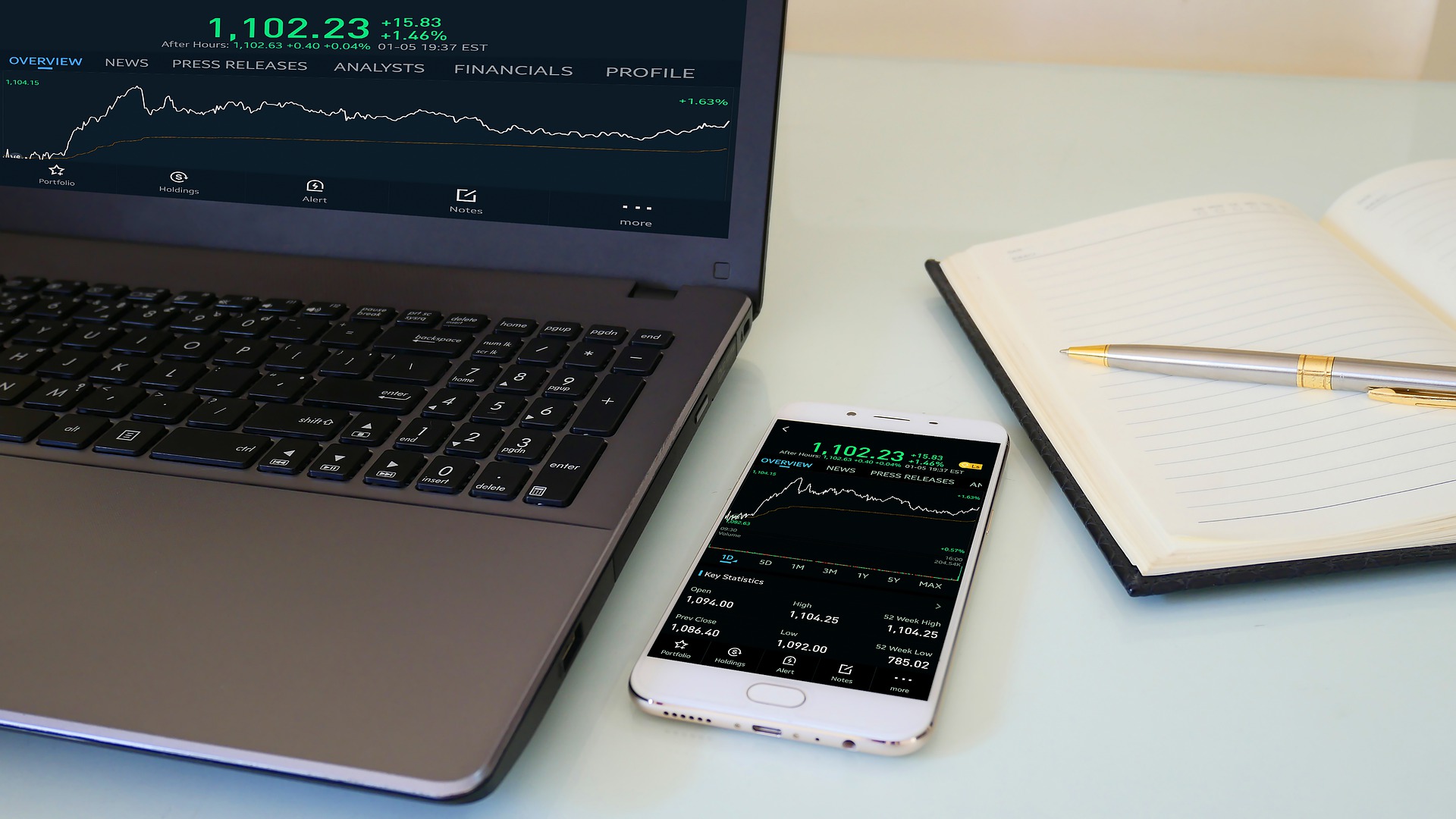
There were days when markets were traded at a physical exchange, which only institutions had access to. But with the advent of internet, most of the trading has shifted online.
Many retail brokerages have opened across the world & in Africa that offer trading on a wide variety of choices of financial instruments like stocks, forex, commodities, cryptos, indices via the internet.
Retail Traders worldwide mostly use their smartphones to place trade & manage them, but this is especially true for Africa. Most of the retail day trading in Africa is done through mobile devices – compared to any other device like PC/desktop, laptops & tablets.
Mobile Penetration in Africa is growing
Africa is often called a mobile-first society, because majority of Africa’s population have wider access to smartphones, more than any other devices.
This is mostly because smartphones are now much cheaper in Africa than ever before, especially due to the fact there are many affordable mobile phone brands available in Africa, moreover many local mobile operators are also offering cheaper data packs with cheaper devices.
According to a GSMA report, Africa’s mobile phone penetration was estimated to be 45% in 2019, and there will be 475 million mobile internet users in Africa by 2025.
Internet data has become a lot cheaper in Africa, so more and more users in Africa are connected online, and use digital platforms like social media, video streaming more & more.
Kenya now has third highest internet users in Africa, estimated to be 46.87 million. Whereas the Nigeria has 126.08 million internet users, which is the highest in Africa.
Most of Africa’s internet users access it via their smartphones, to access services like Banking apps, mobile money, online shopping & now day trading too.
Mobile Trading & reasons for its surge in Africa
Mobile trading is simply when users use their mobile device to access the financial markets & place their trades.
Mobile trading allows users to keep track on their investments, stay updated on market prices and make quick decisions. It offers a high degree of flexibility and reduces role played by intermediaries.
Users can get a lot of information that can help them make better investments. Since trading it done with just one device over an internet connection, the easy of doing business is easier.
Forex Brokers SA reports that in the last few years, there has been a significant surge in number of new investors in Africa. Africa has around 1.3 million online traders investing in Forex, Stocks and Cryptos. And most of these investors & day traders access their platforms via mobile devices.
But why is trading via Smartphone growing in Kenya & in Rest of Africa?
The main reason is that Africa has huge millennial population, whom have access to much more information than older generation, via the internet. Youngsters are able to stay updated on what’s happening around the world and the internet offered new investment opportunities.
Information about trading stocks, growth investing etc. is now readily available for free to all internet users.
Young population are more interested in online investing opportunities as a means to income from the finance markets. There is more awareness than ever before.
Covid-19 has increased the trend towards online investing even more, with people stuck in their home. When the stock markets collapsed in March, 2020 it is estimated that more millennials invested in the stock markets, cryptos, forex than ever before, leading to the phenomena of ‘Robinhood’ traders.
Since the young African population was eager to explore investment opportunities. FinTech companies around the world came flocking to Africa. Over a 100 million dollars have been spent in the recent years to accelerate the growth of FinTech companies.
Many brokers have jumped on to this opportunity & there are now multiple brokers entering the African markets. Also, many countries have taken steps to regulate the online trading industry.
In Kenya, NSE regulated the stock markets and CMA has regulated the online forex & CFD trading industry. Companies like FXPesa (Equiti Group), Faida, Exinity Limited have now acquired local regulation in Kenya with CMA to start offering trading products on mobile.
Also, in Nigeria, companies like CowryWise, PiggyVest, Rise, Wealth.ng are introducing many investment options in different financial instruments via smartphone.
While South Africa has a large number of local brokerages which is infact the highest number in Africa. SA regulator FSCA has regulated over 100+ entities for online trading and investments, most of them offer mobile trading platforms like Hotforex, Exness, Tickmill, IG Markets etc.
The African market is expanding nearly twice as fast as Asia’s. Mobile trading is going to increase exponentially as more users get an active connection.
Rise of interest in crypto investing in Africa
With the African currencies being prone to fluctuation, the instability was wreaking havoc in the lives of many Africans. More and more Africans have started investing in cryptocurrencies and using that as a medium to make payments on the internet as well as to local retailers.
Many crypto trading & exchange platforms like Luno, Binance, Paxful have very large user base in African countries. All these platforms offer their mobile trading apps for easy access to cryptos investments.
But mobile trading has its downsides:
With mobile trading poised to grow, its essential that users are aware of the downside to mobile trading. There’s always a flip side to everything. If there advantages then there definitely will be disadvantages as well.
Though mobile trading provides easy of access, it’s not entirely the best option if you take into account other factors.
Lack of essential information
Since you are trading on a small screen smartphone device, you cannot access all information at once. The apps provided by the brokers are customised for small screens, so it will not have some vital information. So, you will not be provided with the full scenario.
Traders often need to research so many things before making a decision. This is harder on a mobile device.
In major countries where there are many traders, the usual method of trading would be to conduct trades on a computer with a large screen. Very rarely do professional traders do trading from their phones.
The mobile platform is just to stay updated. So, by doing mobile trading you are compromising on a lot of data which can lead to better decision making.
Unstable Mobile internet
Mobile internet connection is prone to disturbance, since there are various factors that can affect it. Having unstable connection can result in a huge loss if you are not able to close a trade in time. You can lose all your investment in a matter of seconds if connection is unavailable.
Wired connection on the other hand is always more stable and you don’t run the risk of your connection getting interrupted. This helps you trade easily without having to worry about the signal strength.
Smartphone Addiction
Once you start getting invested into trading, it’s hard to pull yourself back.
Mobile phones are an addiction in itself. You will not be able to control your actions if you have easy of access to investment opportunities available at your fingertips. This forces you to invest carelessly and these mistakes can cost you your entire life savings.
Unlicensed and Unregulated platforms
Beyond all these factors, some brokers offer only mobile platforms even though they are unlicensed. Small retail traders often ignore this research of finding regulated brokers, often opening account with a broker they have seen in some online advertisement.
If there are any issues with your investments then you cannot do anything since the broker is not regulated by your government and they have no license.
Good established brokers will always offer users the option of trading on web.
How to better use a Mobile Trading App?
Having considered the advantages and the disadvantages, what’s the best way to balance both? Here are a few pointers that can help you decide how to go about mobile trading:
- A good way to use a mobile trading apps is to test your skills using the demo trading account, this was you can understand how the market functions and learn how to trade within a particular platform. Going forward you can make strategies based on how you have performed with the demo account.
- Don’t try to open or close trades on the mobile platform without research, unless the market is very volatile and you need to close the trade as soon as possible. If you unsure about a trade, then it’s better to use a web trader and assess all information before coming to a decision
- Don’t become completely reliant on the mobile platform, whenever possible always use a web trader for more safe and informed decision. Your web trader or application installed on your Laptop should be your main tool for trading than your smartphone.
- If you are travelling then it’s better you don’t trade at all for the entire duration of the travel. But if you want to monitor your investments then use the mobile platform to keep updated.
- Professional traders never watch the market all day, they make short and quick trades and then they are done for the day. Using mobile platform over a period of time will tend to make you over- trade.
Regardless of your choice of device, it’s important to educate yourself as much as possible before you get into trading or any sort of investment.
Don’t jump into online trading & investing for the sake of it, you need to understand how it works, its risks and what factors influence the market. If you don’t understand how it functions then it’s better to stay away from it.





